Organisational Behaviour and Motivation Analysis at Waitrose Ltd.
VerifiedAdded on 2023/01/13
|16
|5373
|67
Report
AI Summary
This report provides a comprehensive analysis of organisational behaviour within Waitrose Ltd., examining the influence of organisational culture, politics, and power on individual and team performance. It evaluates content and process theories of motivation, such as Maslow's hierarchy of needs, and motivational techniques for effective goal achievement. The report also contrasts effective and ineffective teams, exploring cooperation, trust, and communication. Furthermore, it discusses the concepts and philosophies of organisational behaviour within the context of Waitrose Ltd., highlighting the importance of understanding human behaviour in achieving sustainable success and market leadership. The analysis incorporates various examples of positive and negative organisational politics, the use of power, and sources of power within the organisation.
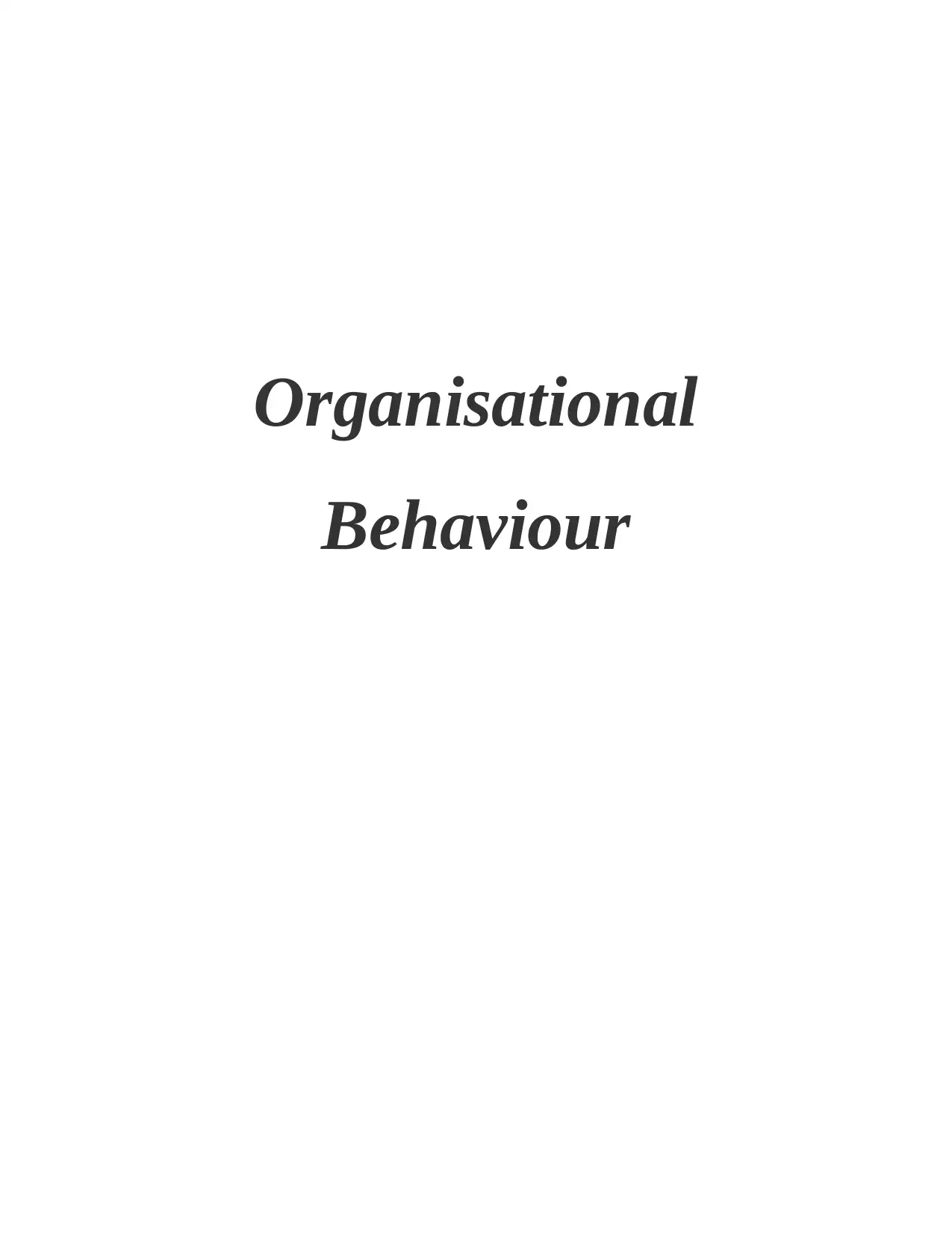
Organisational
Behaviour
Behaviour
Paraphrase This Document
Need a fresh take? Get an instant paraphrase of this document with our AI Paraphraser
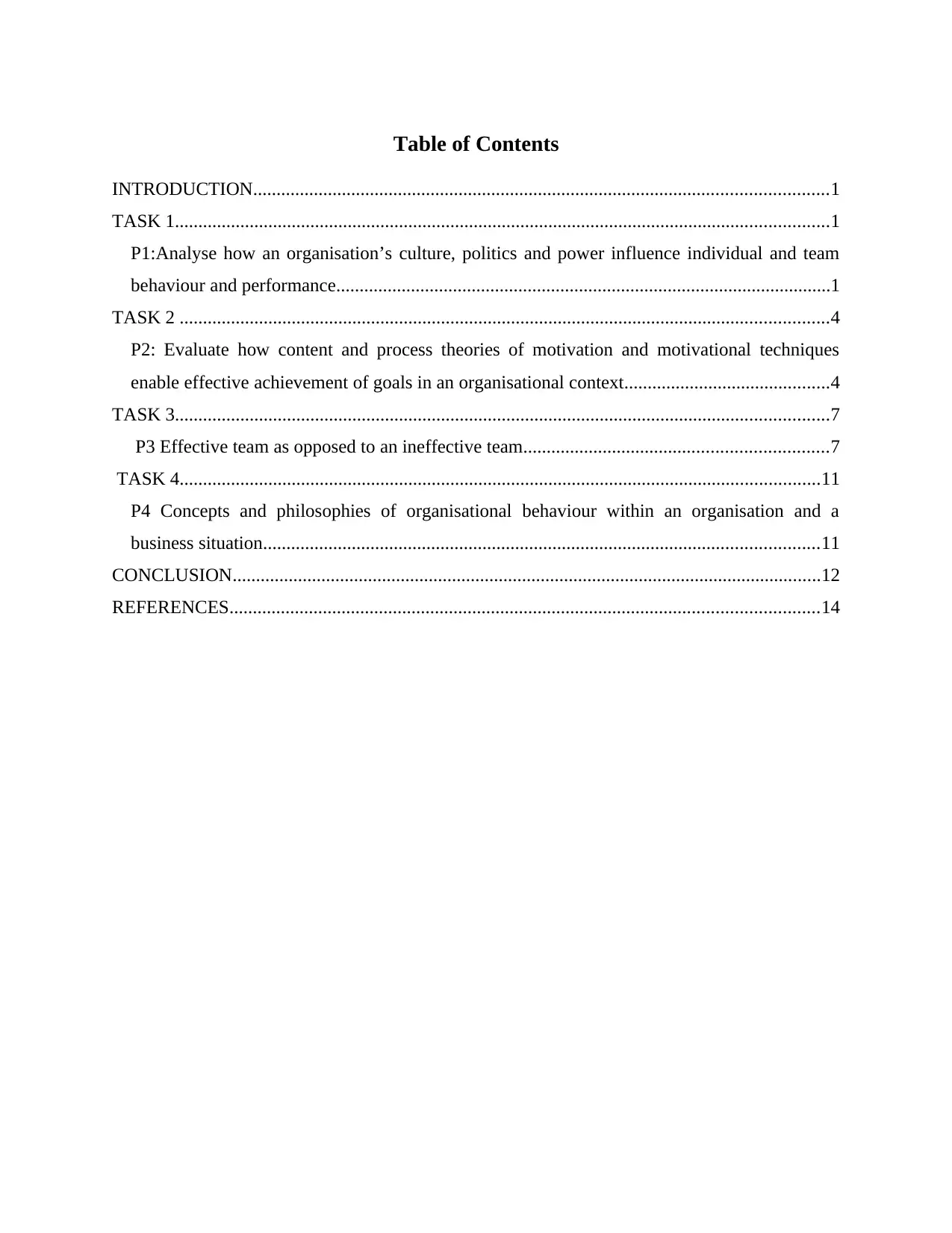
Table of Contents
INTRODUCTION...........................................................................................................................1
TASK 1............................................................................................................................................1
P1:Analyse how an organisation’s culture, politics and power influence individual and team
behaviour and performance..........................................................................................................1
TASK 2 ...........................................................................................................................................4
P2: Evaluate how content and process theories of motivation and motivational techniques
enable effective achievement of goals in an organisational context............................................4
TASK 3............................................................................................................................................7
P3 Effective team as opposed to an ineffective team.................................................................7
TASK 4.........................................................................................................................................11
P4 Concepts and philosophies of organisational behaviour within an organisation and a
business situation.......................................................................................................................11
CONCLUSION..............................................................................................................................12
REFERENCES..............................................................................................................................14
INTRODUCTION...........................................................................................................................1
TASK 1............................................................................................................................................1
P1:Analyse how an organisation’s culture, politics and power influence individual and team
behaviour and performance..........................................................................................................1
TASK 2 ...........................................................................................................................................4
P2: Evaluate how content and process theories of motivation and motivational techniques
enable effective achievement of goals in an organisational context............................................4
TASK 3............................................................................................................................................7
P3 Effective team as opposed to an ineffective team.................................................................7
TASK 4.........................................................................................................................................11
P4 Concepts and philosophies of organisational behaviour within an organisation and a
business situation.......................................................................................................................11
CONCLUSION..............................................................................................................................12
REFERENCES..............................................................................................................................14
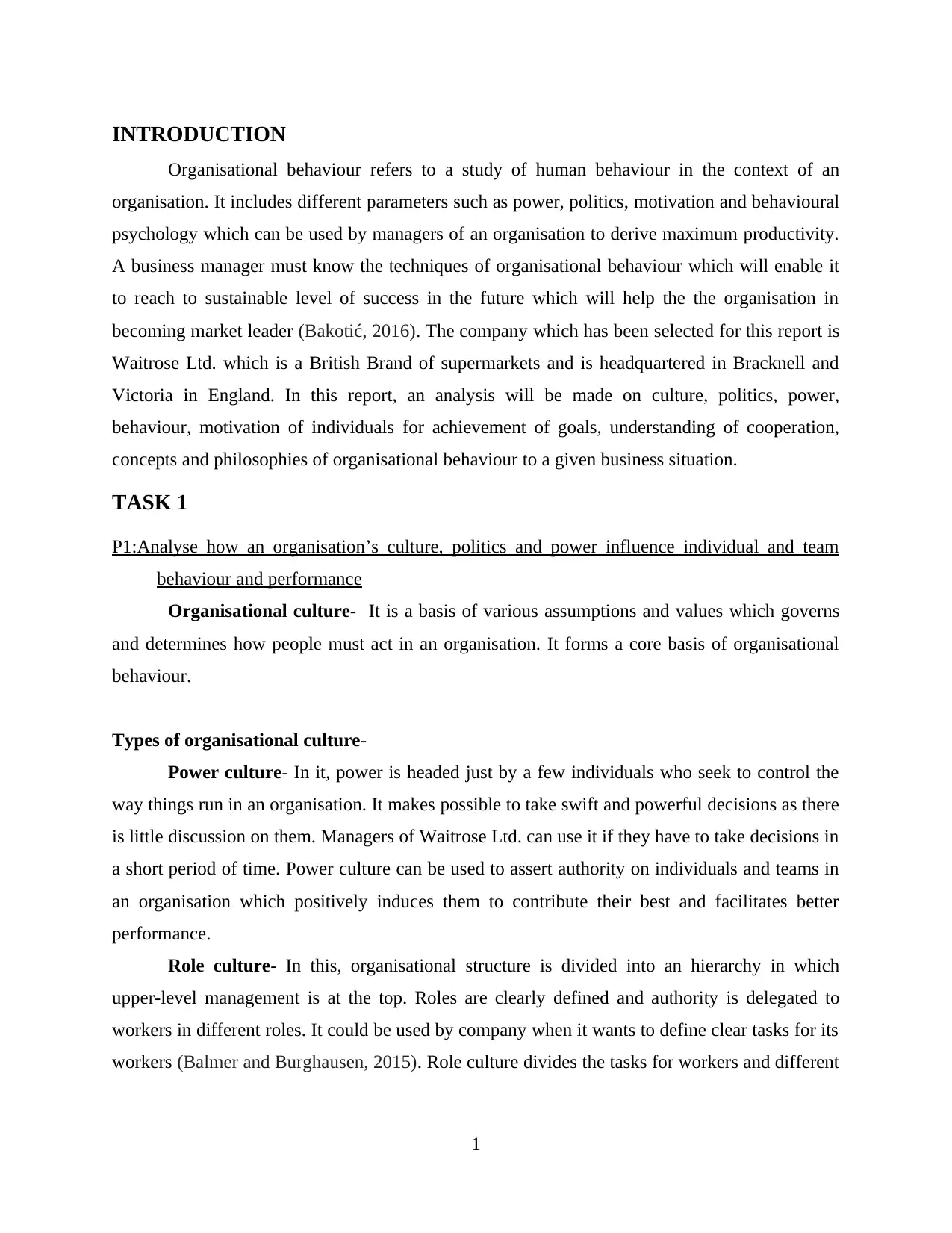
INTRODUCTION
Organisational behaviour refers to a study of human behaviour in the context of an
organisation. It includes different parameters such as power, politics, motivation and behavioural
psychology which can be used by managers of an organisation to derive maximum productivity.
A business manager must know the techniques of organisational behaviour which will enable it
to reach to sustainable level of success in the future which will help the the organisation in
becoming market leader (Bakotić, 2016). The company which has been selected for this report is
Waitrose Ltd. which is a British Brand of supermarkets and is headquartered in Bracknell and
Victoria in England. In this report, an analysis will be made on culture, politics, power,
behaviour, motivation of individuals for achievement of goals, understanding of cooperation,
concepts and philosophies of organisational behaviour to a given business situation.
TASK 1
P1:Analyse how an organisation’s culture, politics and power influence individual and team
behaviour and performance
Organisational culture- It is a basis of various assumptions and values which governs
and determines how people must act in an organisation. It forms a core basis of organisational
behaviour.
Types of organisational culture-
Power culture- In it, power is headed just by a few individuals who seek to control the
way things run in an organisation. It makes possible to take swift and powerful decisions as there
is little discussion on them. Managers of Waitrose Ltd. can use it if they have to take decisions in
a short period of time. Power culture can be used to assert authority on individuals and teams in
an organisation which positively induces them to contribute their best and facilitates better
performance.
Role culture- In this, organisational structure is divided into an hierarchy in which
upper-level management is at the top. Roles are clearly defined and authority is delegated to
workers in different roles. It could be used by company when it wants to define clear tasks for its
workers (Balmer and Burghausen, 2015). Role culture divides the tasks for workers and different
1
Organisational behaviour refers to a study of human behaviour in the context of an
organisation. It includes different parameters such as power, politics, motivation and behavioural
psychology which can be used by managers of an organisation to derive maximum productivity.
A business manager must know the techniques of organisational behaviour which will enable it
to reach to sustainable level of success in the future which will help the the organisation in
becoming market leader (Bakotić, 2016). The company which has been selected for this report is
Waitrose Ltd. which is a British Brand of supermarkets and is headquartered in Bracknell and
Victoria in England. In this report, an analysis will be made on culture, politics, power,
behaviour, motivation of individuals for achievement of goals, understanding of cooperation,
concepts and philosophies of organisational behaviour to a given business situation.
TASK 1
P1:Analyse how an organisation’s culture, politics and power influence individual and team
behaviour and performance
Organisational culture- It is a basis of various assumptions and values which governs
and determines how people must act in an organisation. It forms a core basis of organisational
behaviour.
Types of organisational culture-
Power culture- In it, power is headed just by a few individuals who seek to control the
way things run in an organisation. It makes possible to take swift and powerful decisions as there
is little discussion on them. Managers of Waitrose Ltd. can use it if they have to take decisions in
a short period of time. Power culture can be used to assert authority on individuals and teams in
an organisation which positively induces them to contribute their best and facilitates better
performance.
Role culture- In this, organisational structure is divided into an hierarchy in which
upper-level management is at the top. Roles are clearly defined and authority is delegated to
workers in different roles. It could be used by company when it wants to define clear tasks for its
workers (Balmer and Burghausen, 2015). Role culture divides the tasks for workers and different
1
⊘ This is a preview!⊘
Do you want full access?
Subscribe today to unlock all pages.

Trusted by 1+ million students worldwide
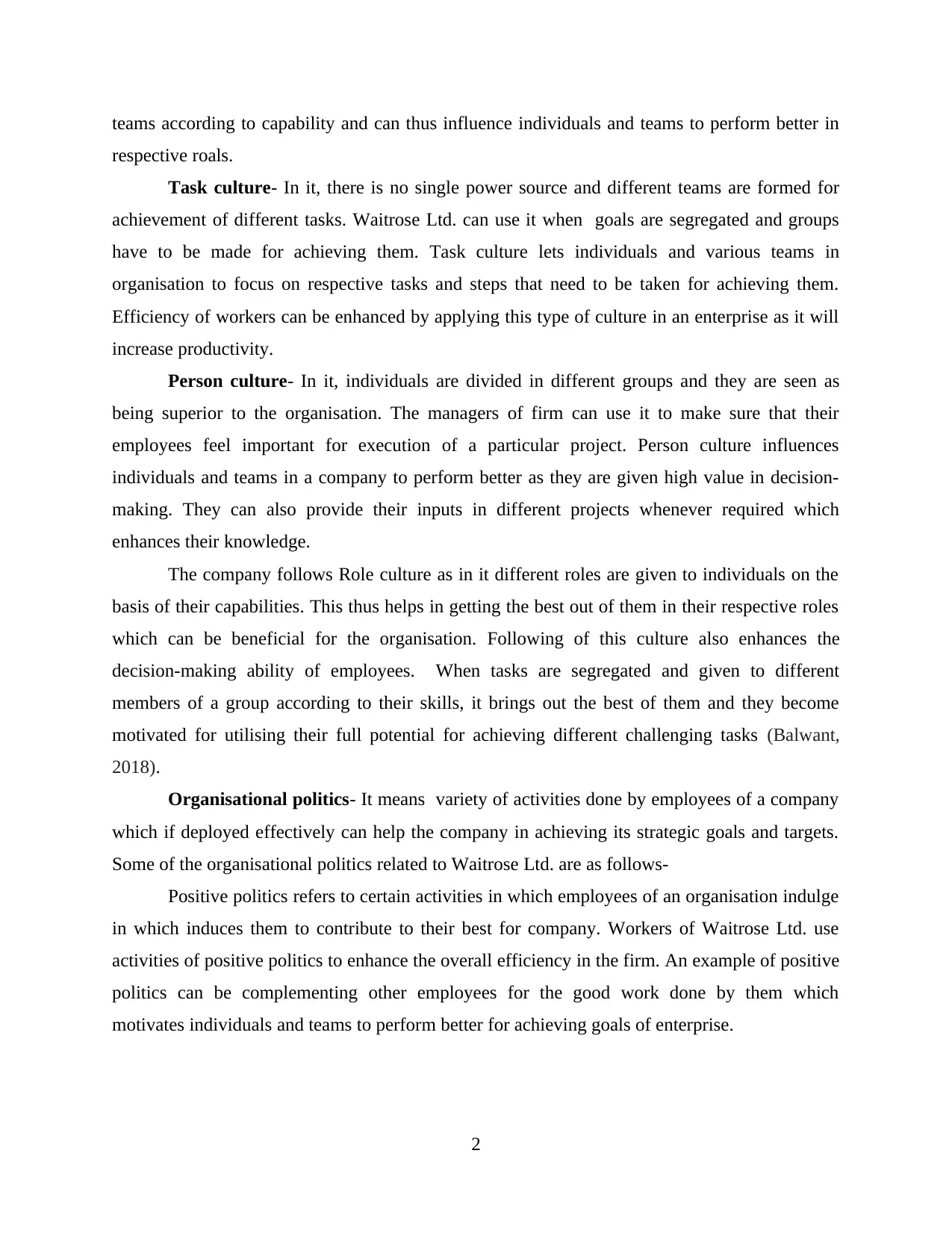
teams according to capability and can thus influence individuals and teams to perform better in
respective roals.
Task culture- In it, there is no single power source and different teams are formed for
achievement of different tasks. Waitrose Ltd. can use it when goals are segregated and groups
have to be made for achieving them. Task culture lets individuals and various teams in
organisation to focus on respective tasks and steps that need to be taken for achieving them.
Efficiency of workers can be enhanced by applying this type of culture in an enterprise as it will
increase productivity.
Person culture- In it, individuals are divided in different groups and they are seen as
being superior to the organisation. The managers of firm can use it to make sure that their
employees feel important for execution of a particular project. Person culture influences
individuals and teams in a company to perform better as they are given high value in decision-
making. They can also provide their inputs in different projects whenever required which
enhances their knowledge.
The company follows Role culture as in it different roles are given to individuals on the
basis of their capabilities. This thus helps in getting the best out of them in their respective roles
which can be beneficial for the organisation. Following of this culture also enhances the
decision-making ability of employees. When tasks are segregated and given to different
members of a group according to their skills, it brings out the best of them and they become
motivated for utilising their full potential for achieving different challenging tasks (Balwant,
2018).
Organisational politics- It means variety of activities done by employees of a company
which if deployed effectively can help the company in achieving its strategic goals and targets.
Some of the organisational politics related to Waitrose Ltd. are as follows-
Positive politics refers to certain activities in which employees of an organisation indulge
in which induces them to contribute to their best for company. Workers of Waitrose Ltd. use
activities of positive politics to enhance the overall efficiency in the firm. An example of positive
politics can be complementing other employees for the good work done by them which
motivates individuals and teams to perform better for achieving goals of enterprise.
2
respective roals.
Task culture- In it, there is no single power source and different teams are formed for
achievement of different tasks. Waitrose Ltd. can use it when goals are segregated and groups
have to be made for achieving them. Task culture lets individuals and various teams in
organisation to focus on respective tasks and steps that need to be taken for achieving them.
Efficiency of workers can be enhanced by applying this type of culture in an enterprise as it will
increase productivity.
Person culture- In it, individuals are divided in different groups and they are seen as
being superior to the organisation. The managers of firm can use it to make sure that their
employees feel important for execution of a particular project. Person culture influences
individuals and teams in a company to perform better as they are given high value in decision-
making. They can also provide their inputs in different projects whenever required which
enhances their knowledge.
The company follows Role culture as in it different roles are given to individuals on the
basis of their capabilities. This thus helps in getting the best out of them in their respective roles
which can be beneficial for the organisation. Following of this culture also enhances the
decision-making ability of employees. When tasks are segregated and given to different
members of a group according to their skills, it brings out the best of them and they become
motivated for utilising their full potential for achieving different challenging tasks (Balwant,
2018).
Organisational politics- It means variety of activities done by employees of a company
which if deployed effectively can help the company in achieving its strategic goals and targets.
Some of the organisational politics related to Waitrose Ltd. are as follows-
Positive politics refers to certain activities in which employees of an organisation indulge
in which induces them to contribute to their best for company. Workers of Waitrose Ltd. use
activities of positive politics to enhance the overall efficiency in the firm. An example of positive
politics can be complementing other employees for the good work done by them which
motivates individuals and teams to perform better for achieving goals of enterprise.
2
Paraphrase This Document
Need a fresh take? Get an instant paraphrase of this document with our AI Paraphraser
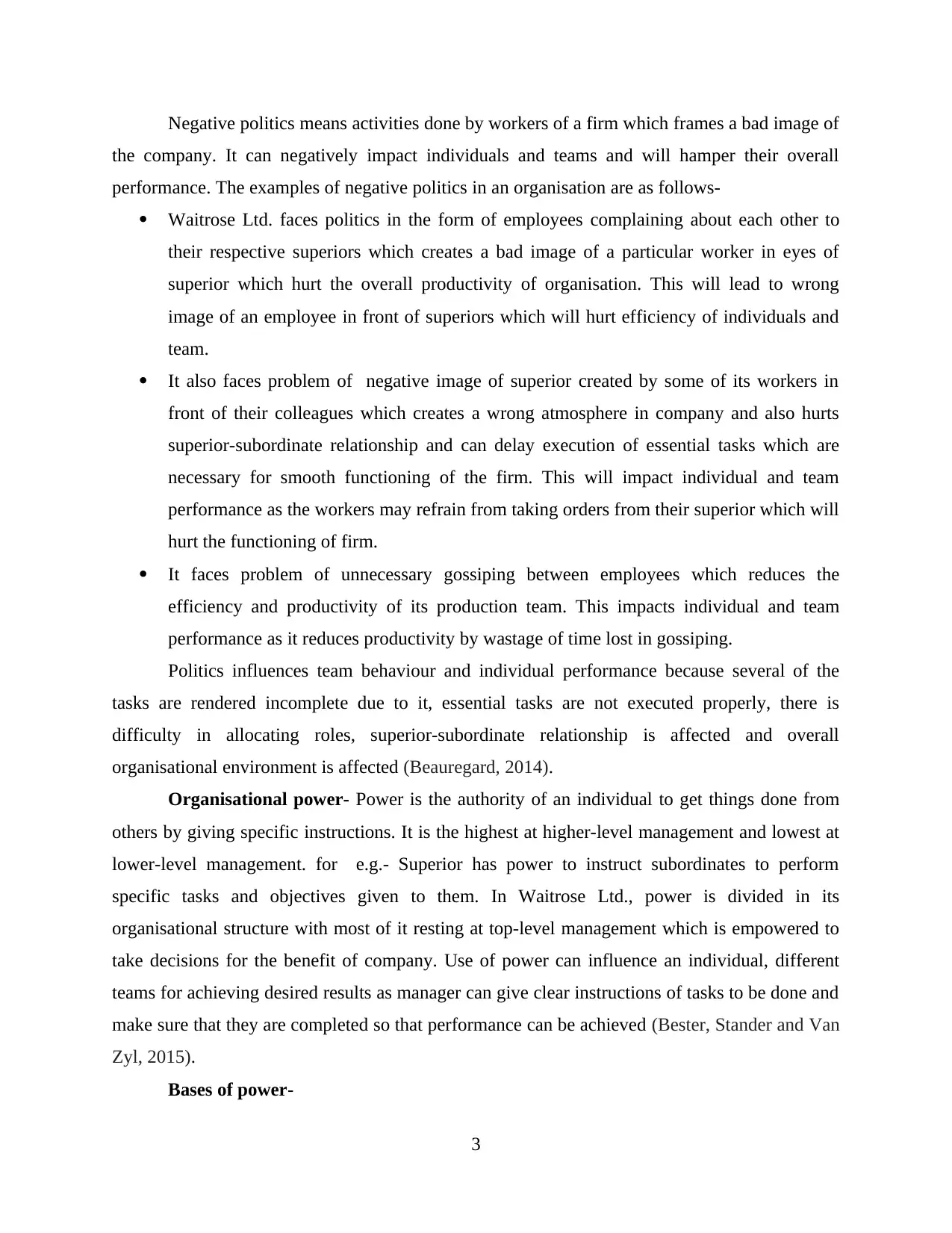
Negative politics means activities done by workers of a firm which frames a bad image of
the company. It can negatively impact individuals and teams and will hamper their overall
performance. The examples of negative politics in an organisation are as follows-
Waitrose Ltd. faces politics in the form of employees complaining about each other to
their respective superiors which creates a bad image of a particular worker in eyes of
superior which hurt the overall productivity of organisation. This will lead to wrong
image of an employee in front of superiors which will hurt efficiency of individuals and
team.
It also faces problem of negative image of superior created by some of its workers in
front of their colleagues which creates a wrong atmosphere in company and also hurts
superior-subordinate relationship and can delay execution of essential tasks which are
necessary for smooth functioning of the firm. This will impact individual and team
performance as the workers may refrain from taking orders from their superior which will
hurt the functioning of firm.
It faces problem of unnecessary gossiping between employees which reduces the
efficiency and productivity of its production team. This impacts individual and team
performance as it reduces productivity by wastage of time lost in gossiping.
Politics influences team behaviour and individual performance because several of the
tasks are rendered incomplete due to it, essential tasks are not executed properly, there is
difficulty in allocating roles, superior-subordinate relationship is affected and overall
organisational environment is affected (Beauregard, 2014).
Organisational power- Power is the authority of an individual to get things done from
others by giving specific instructions. It is the highest at higher-level management and lowest at
lower-level management. for e.g.- Superior has power to instruct subordinates to perform
specific tasks and objectives given to them. In Waitrose Ltd., power is divided in its
organisational structure with most of it resting at top-level management which is empowered to
take decisions for the benefit of company. Use of power can influence an individual, different
teams for achieving desired results as manager can give clear instructions of tasks to be done and
make sure that they are completed so that performance can be achieved (Bester, Stander and Van
Zyl, 2015).
Bases of power-
3
the company. It can negatively impact individuals and teams and will hamper their overall
performance. The examples of negative politics in an organisation are as follows-
Waitrose Ltd. faces politics in the form of employees complaining about each other to
their respective superiors which creates a bad image of a particular worker in eyes of
superior which hurt the overall productivity of organisation. This will lead to wrong
image of an employee in front of superiors which will hurt efficiency of individuals and
team.
It also faces problem of negative image of superior created by some of its workers in
front of their colleagues which creates a wrong atmosphere in company and also hurts
superior-subordinate relationship and can delay execution of essential tasks which are
necessary for smooth functioning of the firm. This will impact individual and team
performance as the workers may refrain from taking orders from their superior which will
hurt the functioning of firm.
It faces problem of unnecessary gossiping between employees which reduces the
efficiency and productivity of its production team. This impacts individual and team
performance as it reduces productivity by wastage of time lost in gossiping.
Politics influences team behaviour and individual performance because several of the
tasks are rendered incomplete due to it, essential tasks are not executed properly, there is
difficulty in allocating roles, superior-subordinate relationship is affected and overall
organisational environment is affected (Beauregard, 2014).
Organisational power- Power is the authority of an individual to get things done from
others by giving specific instructions. It is the highest at higher-level management and lowest at
lower-level management. for e.g.- Superior has power to instruct subordinates to perform
specific tasks and objectives given to them. In Waitrose Ltd., power is divided in its
organisational structure with most of it resting at top-level management which is empowered to
take decisions for the benefit of company. Use of power can influence an individual, different
teams for achieving desired results as manager can give clear instructions of tasks to be done and
make sure that they are completed so that performance can be achieved (Bester, Stander and Van
Zyl, 2015).
Bases of power-
3
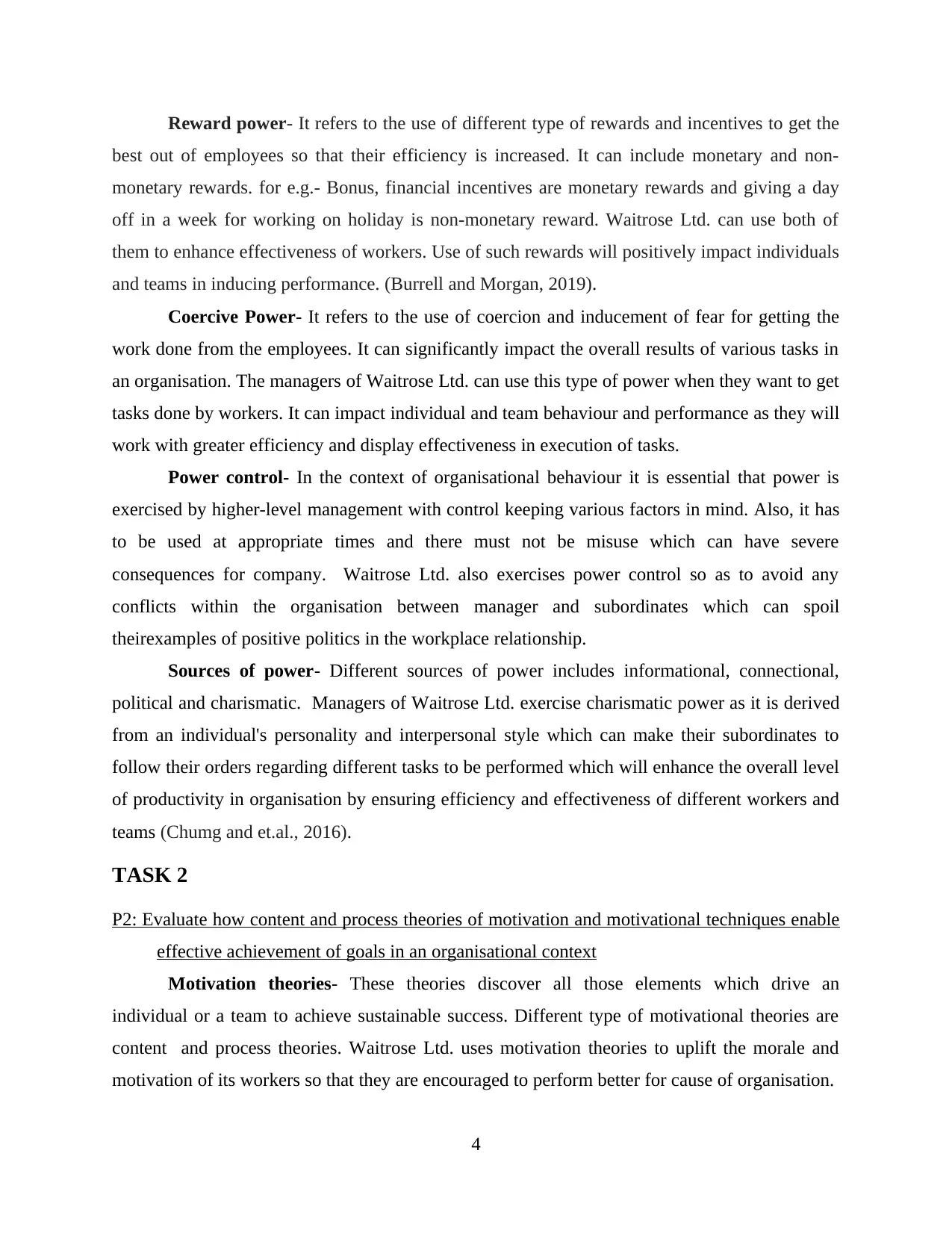
Reward power- It refers to the use of different type of rewards and incentives to get the
best out of employees so that their efficiency is increased. It can include monetary and non-
monetary rewards. for e.g.- Bonus, financial incentives are monetary rewards and giving a day
off in a week for working on holiday is non-monetary reward. Waitrose Ltd. can use both of
them to enhance effectiveness of workers. Use of such rewards will positively impact individuals
and teams in inducing performance. (Burrell and Morgan, 2019).
Coercive Power- It refers to the use of coercion and inducement of fear for getting the
work done from the employees. It can significantly impact the overall results of various tasks in
an organisation. The managers of Waitrose Ltd. can use this type of power when they want to get
tasks done by workers. It can impact individual and team behaviour and performance as they will
work with greater efficiency and display effectiveness in execution of tasks.
Power control- In the context of organisational behaviour it is essential that power is
exercised by higher-level management with control keeping various factors in mind. Also, it has
to be used at appropriate times and there must not be misuse which can have severe
consequences for company. Waitrose Ltd. also exercises power control so as to avoid any
conflicts within the organisation between manager and subordinates which can spoil
theirexamples of positive politics in the workplace relationship.
Sources of power- Different sources of power includes informational, connectional,
political and charismatic. Managers of Waitrose Ltd. exercise charismatic power as it is derived
from an individual's personality and interpersonal style which can make their subordinates to
follow their orders regarding different tasks to be performed which will enhance the overall level
of productivity in organisation by ensuring efficiency and effectiveness of different workers and
teams (Chumg and et.al., 2016).
TASK 2
P2: Evaluate how content and process theories of motivation and motivational techniques enable
effective achievement of goals in an organisational context
Motivation theories- These theories discover all those elements which drive an
individual or a team to achieve sustainable success. Different type of motivational theories are
content and process theories. Waitrose Ltd. uses motivation theories to uplift the morale and
motivation of its workers so that they are encouraged to perform better for cause of organisation.
4
best out of employees so that their efficiency is increased. It can include monetary and non-
monetary rewards. for e.g.- Bonus, financial incentives are monetary rewards and giving a day
off in a week for working on holiday is non-monetary reward. Waitrose Ltd. can use both of
them to enhance effectiveness of workers. Use of such rewards will positively impact individuals
and teams in inducing performance. (Burrell and Morgan, 2019).
Coercive Power- It refers to the use of coercion and inducement of fear for getting the
work done from the employees. It can significantly impact the overall results of various tasks in
an organisation. The managers of Waitrose Ltd. can use this type of power when they want to get
tasks done by workers. It can impact individual and team behaviour and performance as they will
work with greater efficiency and display effectiveness in execution of tasks.
Power control- In the context of organisational behaviour it is essential that power is
exercised by higher-level management with control keeping various factors in mind. Also, it has
to be used at appropriate times and there must not be misuse which can have severe
consequences for company. Waitrose Ltd. also exercises power control so as to avoid any
conflicts within the organisation between manager and subordinates which can spoil
theirexamples of positive politics in the workplace relationship.
Sources of power- Different sources of power includes informational, connectional,
political and charismatic. Managers of Waitrose Ltd. exercise charismatic power as it is derived
from an individual's personality and interpersonal style which can make their subordinates to
follow their orders regarding different tasks to be performed which will enhance the overall level
of productivity in organisation by ensuring efficiency and effectiveness of different workers and
teams (Chumg and et.al., 2016).
TASK 2
P2: Evaluate how content and process theories of motivation and motivational techniques enable
effective achievement of goals in an organisational context
Motivation theories- These theories discover all those elements which drive an
individual or a team to achieve sustainable success. Different type of motivational theories are
content and process theories. Waitrose Ltd. uses motivation theories to uplift the morale and
motivation of its workers so that they are encouraged to perform better for cause of organisation.
4
⊘ This is a preview!⊘
Do you want full access?
Subscribe today to unlock all pages.

Trusted by 1+ million students worldwide
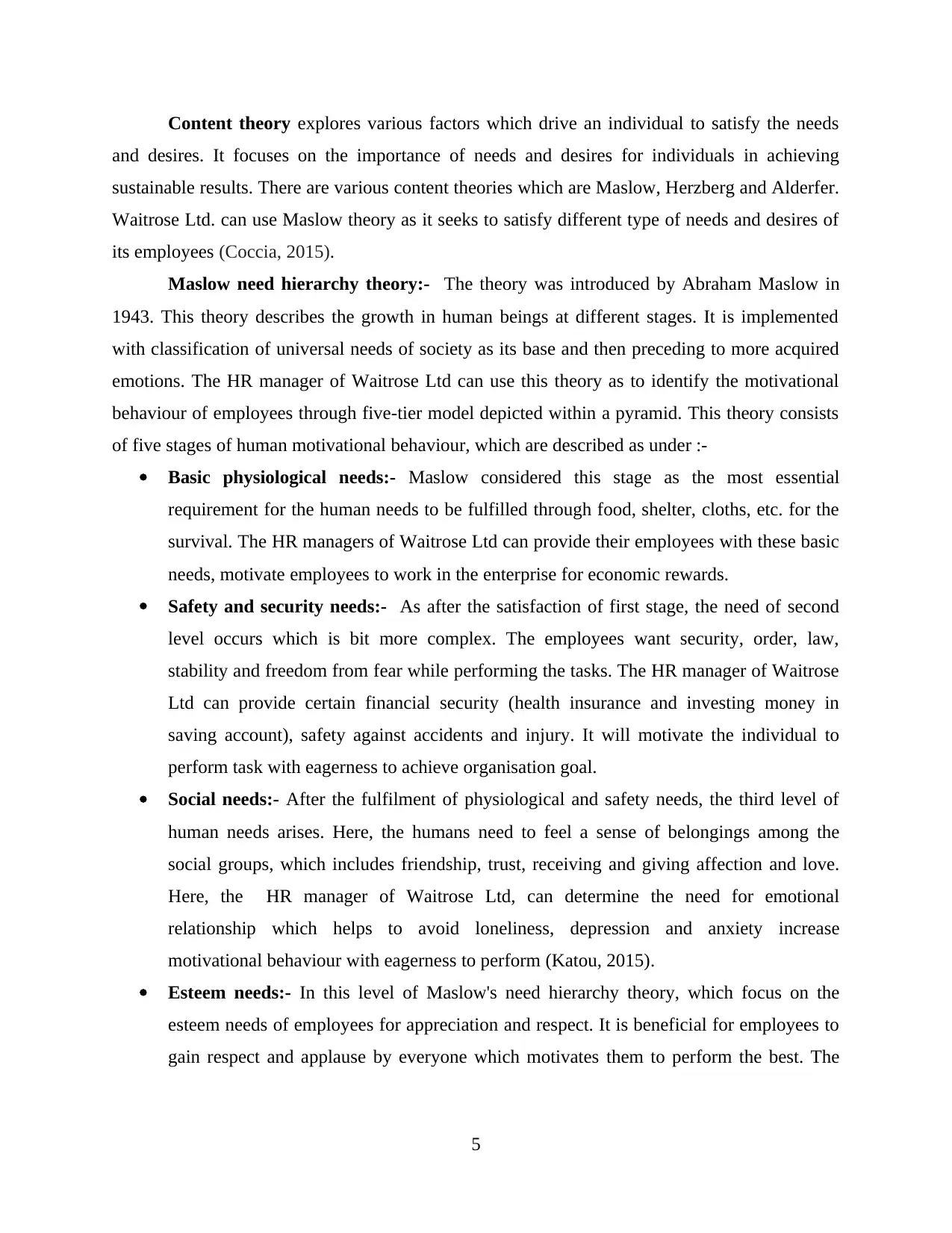
Content theory explores various factors which drive an individual to satisfy the needs
and desires. It focuses on the importance of needs and desires for individuals in achieving
sustainable results. There are various content theories which are Maslow, Herzberg and Alderfer.
Waitrose Ltd. can use Maslow theory as it seeks to satisfy different type of needs and desires of
its employees (Coccia, 2015).
Maslow need hierarchy theory:- The theory was introduced by Abraham Maslow in
1943. This theory describes the growth in human beings at different stages. It is implemented
with classification of universal needs of society as its base and then preceding to more acquired
emotions. The HR manager of Waitrose Ltd can use this theory as to identify the motivational
behaviour of employees through five-tier model depicted within a pyramid. This theory consists
of five stages of human motivational behaviour, which are described as under :-
Basic physiological needs:- Maslow considered this stage as the most essential
requirement for the human needs to be fulfilled through food, shelter, cloths, etc. for the
survival. The HR managers of Waitrose Ltd can provide their employees with these basic
needs, motivate employees to work in the enterprise for economic rewards.
Safety and security needs:- As after the satisfaction of first stage, the need of second
level occurs which is bit more complex. The employees want security, order, law,
stability and freedom from fear while performing the tasks. The HR manager of Waitrose
Ltd can provide certain financial security (health insurance and investing money in
saving account), safety against accidents and injury. It will motivate the individual to
perform task with eagerness to achieve organisation goal.
Social needs:- After the fulfilment of physiological and safety needs, the third level of
human needs arises. Here, the humans need to feel a sense of belongings among the
social groups, which includes friendship, trust, receiving and giving affection and love.
Here, the HR manager of Waitrose Ltd, can determine the need for emotional
relationship which helps to avoid loneliness, depression and anxiety increase
motivational behaviour with eagerness to perform (Katou, 2015).
Esteem needs:- In this level of Maslow's need hierarchy theory, which focus on the
esteem needs of employees for appreciation and respect. It is beneficial for employees to
gain respect and applause by everyone which motivates them to perform the best. The
5
and desires. It focuses on the importance of needs and desires for individuals in achieving
sustainable results. There are various content theories which are Maslow, Herzberg and Alderfer.
Waitrose Ltd. can use Maslow theory as it seeks to satisfy different type of needs and desires of
its employees (Coccia, 2015).
Maslow need hierarchy theory:- The theory was introduced by Abraham Maslow in
1943. This theory describes the growth in human beings at different stages. It is implemented
with classification of universal needs of society as its base and then preceding to more acquired
emotions. The HR manager of Waitrose Ltd can use this theory as to identify the motivational
behaviour of employees through five-tier model depicted within a pyramid. This theory consists
of five stages of human motivational behaviour, which are described as under :-
Basic physiological needs:- Maslow considered this stage as the most essential
requirement for the human needs to be fulfilled through food, shelter, cloths, etc. for the
survival. The HR managers of Waitrose Ltd can provide their employees with these basic
needs, motivate employees to work in the enterprise for economic rewards.
Safety and security needs:- As after the satisfaction of first stage, the need of second
level occurs which is bit more complex. The employees want security, order, law,
stability and freedom from fear while performing the tasks. The HR manager of Waitrose
Ltd can provide certain financial security (health insurance and investing money in
saving account), safety against accidents and injury. It will motivate the individual to
perform task with eagerness to achieve organisation goal.
Social needs:- After the fulfilment of physiological and safety needs, the third level of
human needs arises. Here, the humans need to feel a sense of belongings among the
social groups, which includes friendship, trust, receiving and giving affection and love.
Here, the HR manager of Waitrose Ltd, can determine the need for emotional
relationship which helps to avoid loneliness, depression and anxiety increase
motivational behaviour with eagerness to perform (Katou, 2015).
Esteem needs:- In this level of Maslow's need hierarchy theory, which focus on the
esteem needs of employees for appreciation and respect. It is beneficial for employees to
gain respect and applause by everyone which motivates them to perform the best. The
5
Paraphrase This Document
Need a fresh take? Get an instant paraphrase of this document with our AI Paraphraser
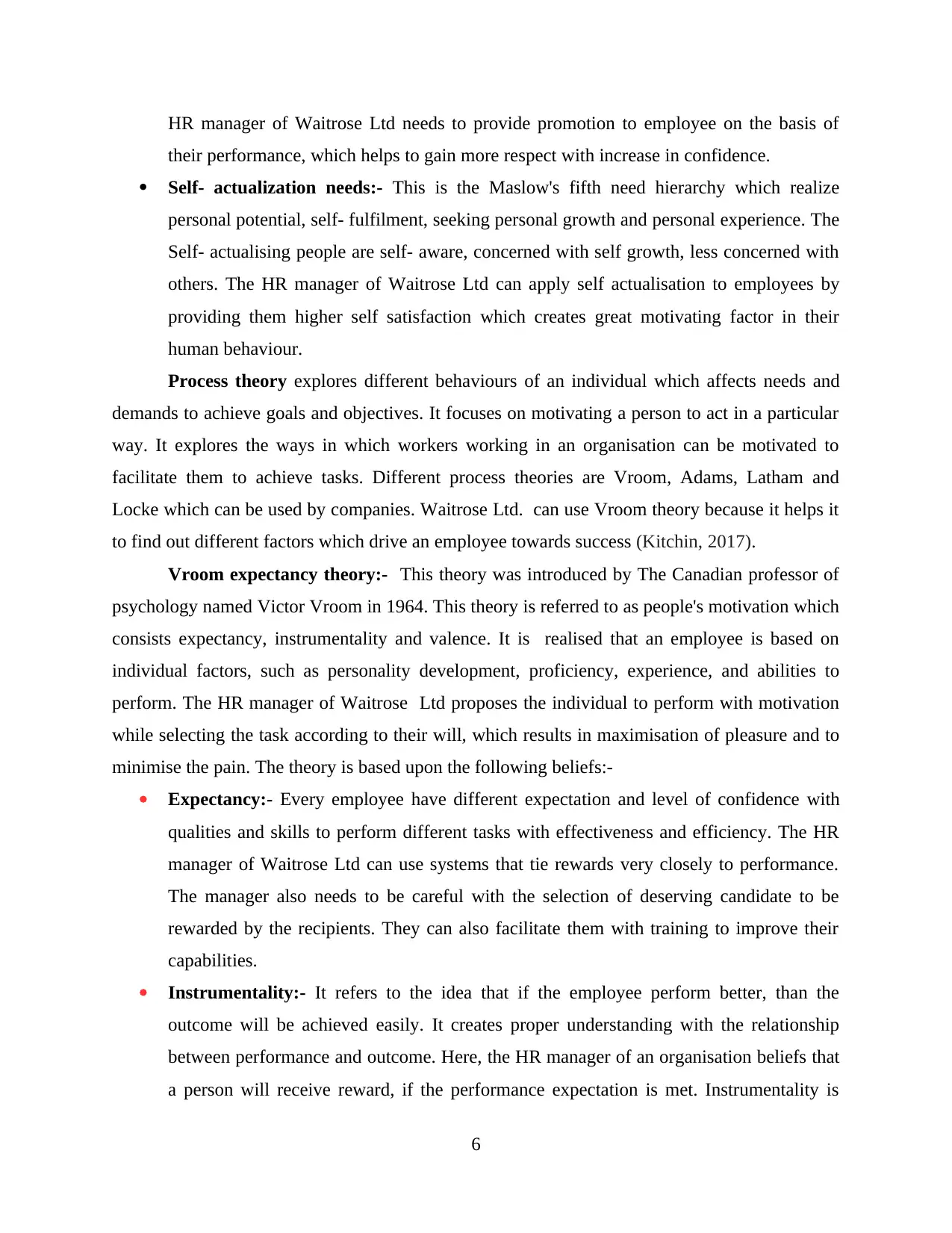
HR manager of Waitrose Ltd needs to provide promotion to employee on the basis of
their performance, which helps to gain more respect with increase in confidence.
Self- actualization needs:- This is the Maslow's fifth need hierarchy which realize
personal potential, self- fulfilment, seeking personal growth and personal experience. The
Self- actualising people are self- aware, concerned with self growth, less concerned with
others. The HR manager of Waitrose Ltd can apply self actualisation to employees by
providing them higher self satisfaction which creates great motivating factor in their
human behaviour.
Process theory explores different behaviours of an individual which affects needs and
demands to achieve goals and objectives. It focuses on motivating a person to act in a particular
way. It explores the ways in which workers working in an organisation can be motivated to
facilitate them to achieve tasks. Different process theories are Vroom, Adams, Latham and
Locke which can be used by companies. Waitrose Ltd. can use Vroom theory because it helps it
to find out different factors which drive an employee towards success (Kitchin, 2017).
Vroom expectancy theory:- This theory was introduced by The Canadian professor of
psychology named Victor Vroom in 1964. This theory is referred to as people's motivation which
consists expectancy, instrumentality and valence. It is realised that an employee is based on
individual factors, such as personality development, proficiency, experience, and abilities to
perform. The HR manager of Waitrose Ltd proposes the individual to perform with motivation
while selecting the task according to their will, which results in maximisation of pleasure and to
minimise the pain. The theory is based upon the following beliefs:-
Expectancy:- Every employee have different expectation and level of confidence with
qualities and skills to perform different tasks with effectiveness and efficiency. The HR
manager of Waitrose Ltd can use systems that tie rewards very closely to performance.
The manager also needs to be careful with the selection of deserving candidate to be
rewarded by the recipients. They can also facilitate them with training to improve their
capabilities.
Instrumentality:- It refers to the idea that if the employee perform better, than the
outcome will be achieved easily. It creates proper understanding with the relationship
between performance and outcome. Here, the HR manager of an organisation beliefs that
a person will receive reward, if the performance expectation is met. Instrumentality is
6
their performance, which helps to gain more respect with increase in confidence.
Self- actualization needs:- This is the Maslow's fifth need hierarchy which realize
personal potential, self- fulfilment, seeking personal growth and personal experience. The
Self- actualising people are self- aware, concerned with self growth, less concerned with
others. The HR manager of Waitrose Ltd can apply self actualisation to employees by
providing them higher self satisfaction which creates great motivating factor in their
human behaviour.
Process theory explores different behaviours of an individual which affects needs and
demands to achieve goals and objectives. It focuses on motivating a person to act in a particular
way. It explores the ways in which workers working in an organisation can be motivated to
facilitate them to achieve tasks. Different process theories are Vroom, Adams, Latham and
Locke which can be used by companies. Waitrose Ltd. can use Vroom theory because it helps it
to find out different factors which drive an employee towards success (Kitchin, 2017).
Vroom expectancy theory:- This theory was introduced by The Canadian professor of
psychology named Victor Vroom in 1964. This theory is referred to as people's motivation which
consists expectancy, instrumentality and valence. It is realised that an employee is based on
individual factors, such as personality development, proficiency, experience, and abilities to
perform. The HR manager of Waitrose Ltd proposes the individual to perform with motivation
while selecting the task according to their will, which results in maximisation of pleasure and to
minimise the pain. The theory is based upon the following beliefs:-
Expectancy:- Every employee have different expectation and level of confidence with
qualities and skills to perform different tasks with effectiveness and efficiency. The HR
manager of Waitrose Ltd can use systems that tie rewards very closely to performance.
The manager also needs to be careful with the selection of deserving candidate to be
rewarded by the recipients. They can also facilitate them with training to improve their
capabilities.
Instrumentality:- It refers to the idea that if the employee perform better, than the
outcome will be achieved easily. It creates proper understanding with the relationship
between performance and outcome. Here, the HR manager of an organisation beliefs that
a person will receive reward, if the performance expectation is met. Instrumentality is
6
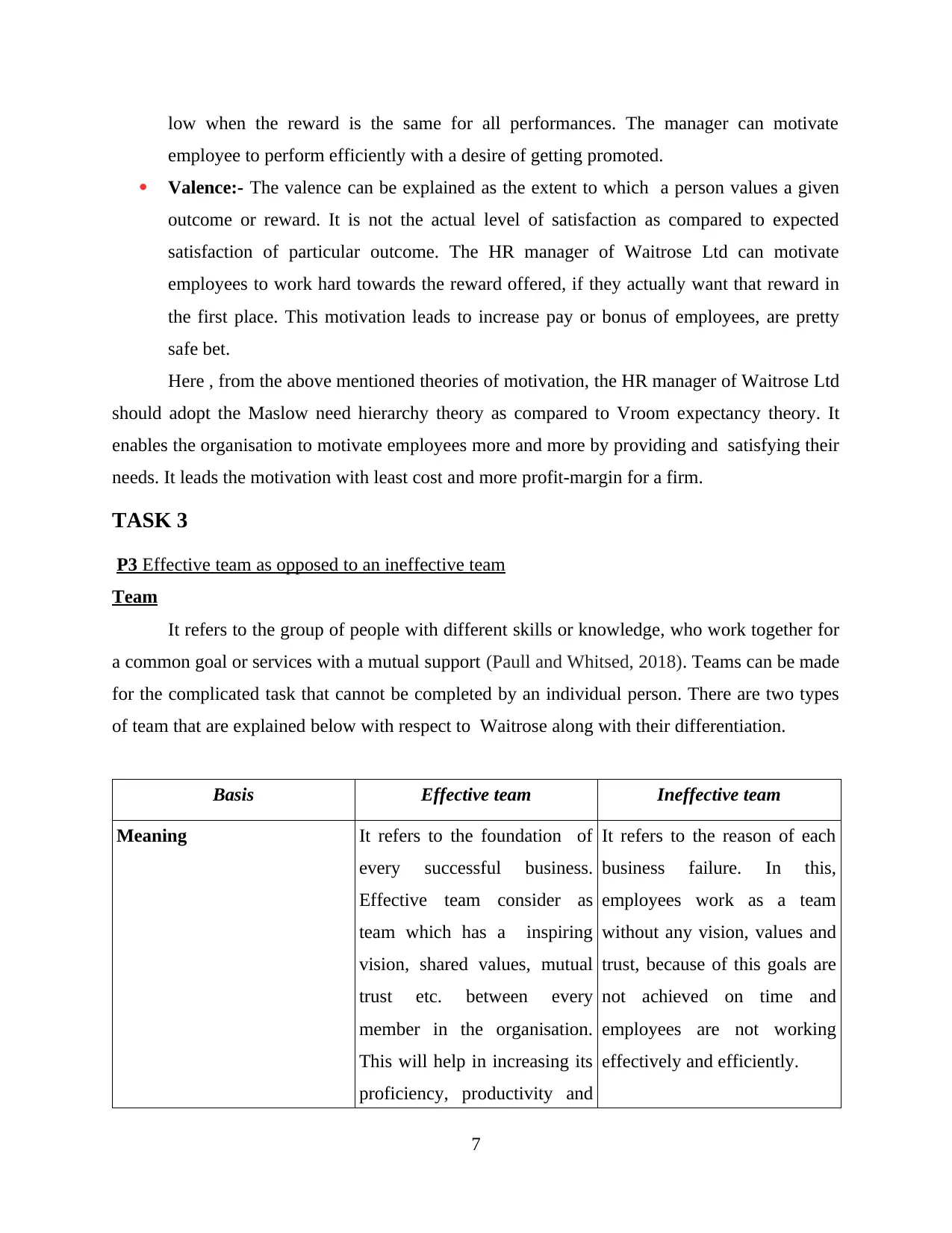
low when the reward is the same for all performances. The manager can motivate
employee to perform efficiently with a desire of getting promoted.
Valence:- The valence can be explained as the extent to which a person values a given
outcome or reward. It is not the actual level of satisfaction as compared to expected
satisfaction of particular outcome. The HR manager of Waitrose Ltd can motivate
employees to work hard towards the reward offered, if they actually want that reward in
the first place. This motivation leads to increase pay or bonus of employees, are pretty
safe bet.
Here , from the above mentioned theories of motivation, the HR manager of Waitrose Ltd
should adopt the Maslow need hierarchy theory as compared to Vroom expectancy theory. It
enables the organisation to motivate employees more and more by providing and satisfying their
needs. It leads the motivation with least cost and more profit-margin for a firm.
TASK 3
P3 Effective team as opposed to an ineffective team
Team
It refers to the group of people with different skills or knowledge, who work together for
a common goal or services with a mutual support (Paull and Whitsed, 2018). Teams can be made
for the complicated task that cannot be completed by an individual person. There are two types
of team that are explained below with respect to Waitrose along with their differentiation.
Basis Effective team Ineffective team
Meaning It refers to the foundation of
every successful business.
Effective team consider as
team which has a inspiring
vision, shared values, mutual
trust etc. between every
member in the organisation.
This will help in increasing its
proficiency, productivity and
It refers to the reason of each
business failure. In this,
employees work as a team
without any vision, values and
trust, because of this goals are
not achieved on time and
employees are not working
effectively and efficiently.
7
employee to perform efficiently with a desire of getting promoted.
Valence:- The valence can be explained as the extent to which a person values a given
outcome or reward. It is not the actual level of satisfaction as compared to expected
satisfaction of particular outcome. The HR manager of Waitrose Ltd can motivate
employees to work hard towards the reward offered, if they actually want that reward in
the first place. This motivation leads to increase pay or bonus of employees, are pretty
safe bet.
Here , from the above mentioned theories of motivation, the HR manager of Waitrose Ltd
should adopt the Maslow need hierarchy theory as compared to Vroom expectancy theory. It
enables the organisation to motivate employees more and more by providing and satisfying their
needs. It leads the motivation with least cost and more profit-margin for a firm.
TASK 3
P3 Effective team as opposed to an ineffective team
Team
It refers to the group of people with different skills or knowledge, who work together for
a common goal or services with a mutual support (Paull and Whitsed, 2018). Teams can be made
for the complicated task that cannot be completed by an individual person. There are two types
of team that are explained below with respect to Waitrose along with their differentiation.
Basis Effective team Ineffective team
Meaning It refers to the foundation of
every successful business.
Effective team consider as
team which has a inspiring
vision, shared values, mutual
trust etc. between every
member in the organisation.
This will help in increasing its
proficiency, productivity and
It refers to the reason of each
business failure. In this,
employees work as a team
without any vision, values and
trust, because of this goals are
not achieved on time and
employees are not working
effectively and efficiently.
7
⊘ This is a preview!⊘
Do you want full access?
Subscribe today to unlock all pages.

Trusted by 1+ million students worldwide
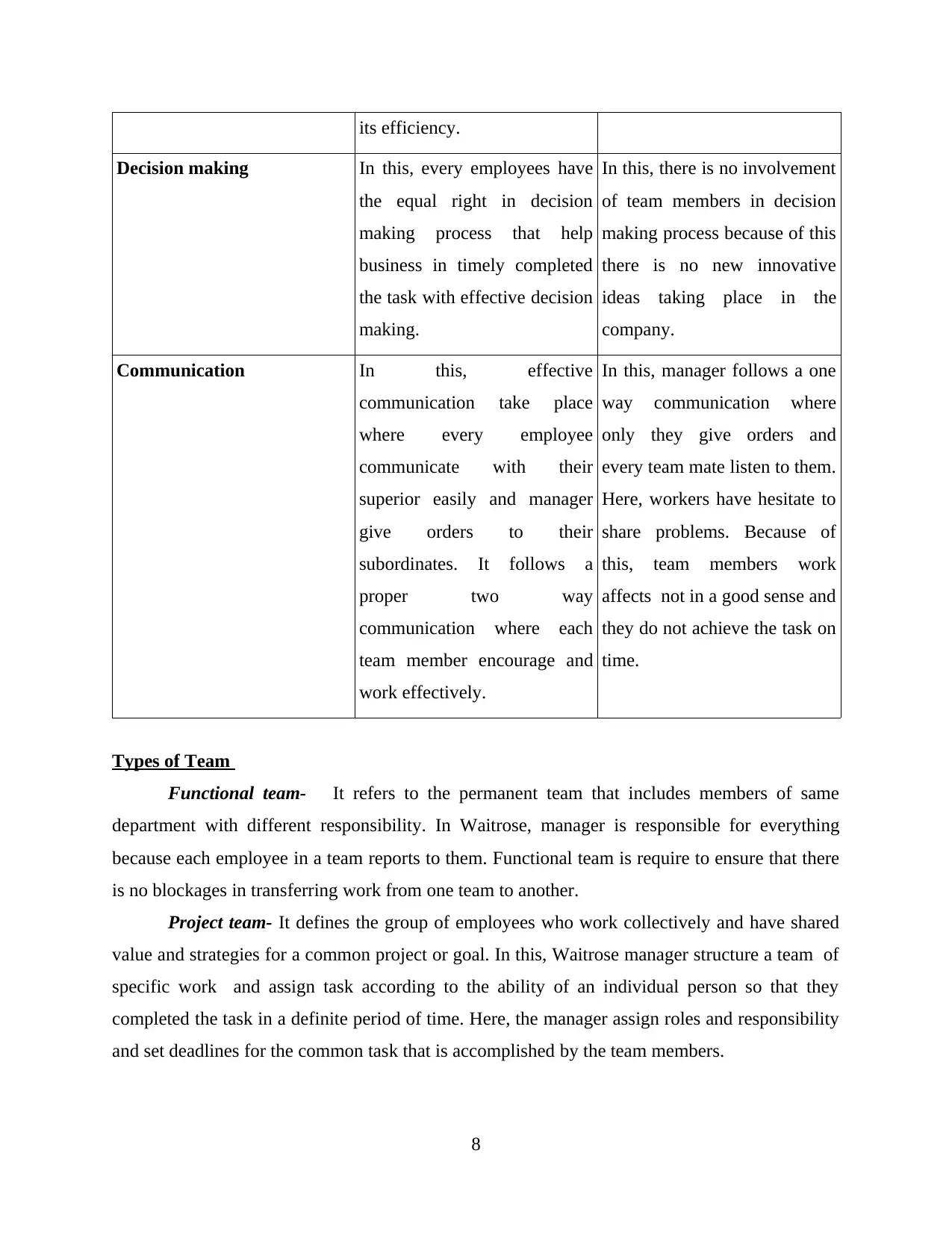
its efficiency.
Decision making In this, every employees have
the equal right in decision
making process that help
business in timely completed
the task with effective decision
making.
In this, there is no involvement
of team members in decision
making process because of this
there is no new innovative
ideas taking place in the
company.
Communication In this, effective
communication take place
where every employee
communicate with their
superior easily and manager
give orders to their
subordinates. It follows a
proper two way
communication where each
team member encourage and
work effectively.
In this, manager follows a one
way communication where
only they give orders and
every team mate listen to them.
Here, workers have hesitate to
share problems. Because of
this, team members work
affects not in a good sense and
they do not achieve the task on
time.
Types of Team
Functional team- It refers to the permanent team that includes members of same
department with different responsibility. In Waitrose, manager is responsible for everything
because each employee in a team reports to them. Functional team is require to ensure that there
is no blockages in transferring work from one team to another.
Project team- It defines the group of employees who work collectively and have shared
value and strategies for a common project or goal. In this, Waitrose manager structure a team of
specific work and assign task according to the ability of an individual person so that they
completed the task in a definite period of time. Here, the manager assign roles and responsibility
and set deadlines for the common task that is accomplished by the team members.
8
Decision making In this, every employees have
the equal right in decision
making process that help
business in timely completed
the task with effective decision
making.
In this, there is no involvement
of team members in decision
making process because of this
there is no new innovative
ideas taking place in the
company.
Communication In this, effective
communication take place
where every employee
communicate with their
superior easily and manager
give orders to their
subordinates. It follows a
proper two way
communication where each
team member encourage and
work effectively.
In this, manager follows a one
way communication where
only they give orders and
every team mate listen to them.
Here, workers have hesitate to
share problems. Because of
this, team members work
affects not in a good sense and
they do not achieve the task on
time.
Types of Team
Functional team- It refers to the permanent team that includes members of same
department with different responsibility. In Waitrose, manager is responsible for everything
because each employee in a team reports to them. Functional team is require to ensure that there
is no blockages in transferring work from one team to another.
Project team- It defines the group of employees who work collectively and have shared
value and strategies for a common project or goal. In this, Waitrose manager structure a team of
specific work and assign task according to the ability of an individual person so that they
completed the task in a definite period of time. Here, the manager assign roles and responsibility
and set deadlines for the common task that is accomplished by the team members.
8
Paraphrase This Document
Need a fresh take? Get an instant paraphrase of this document with our AI Paraphraser
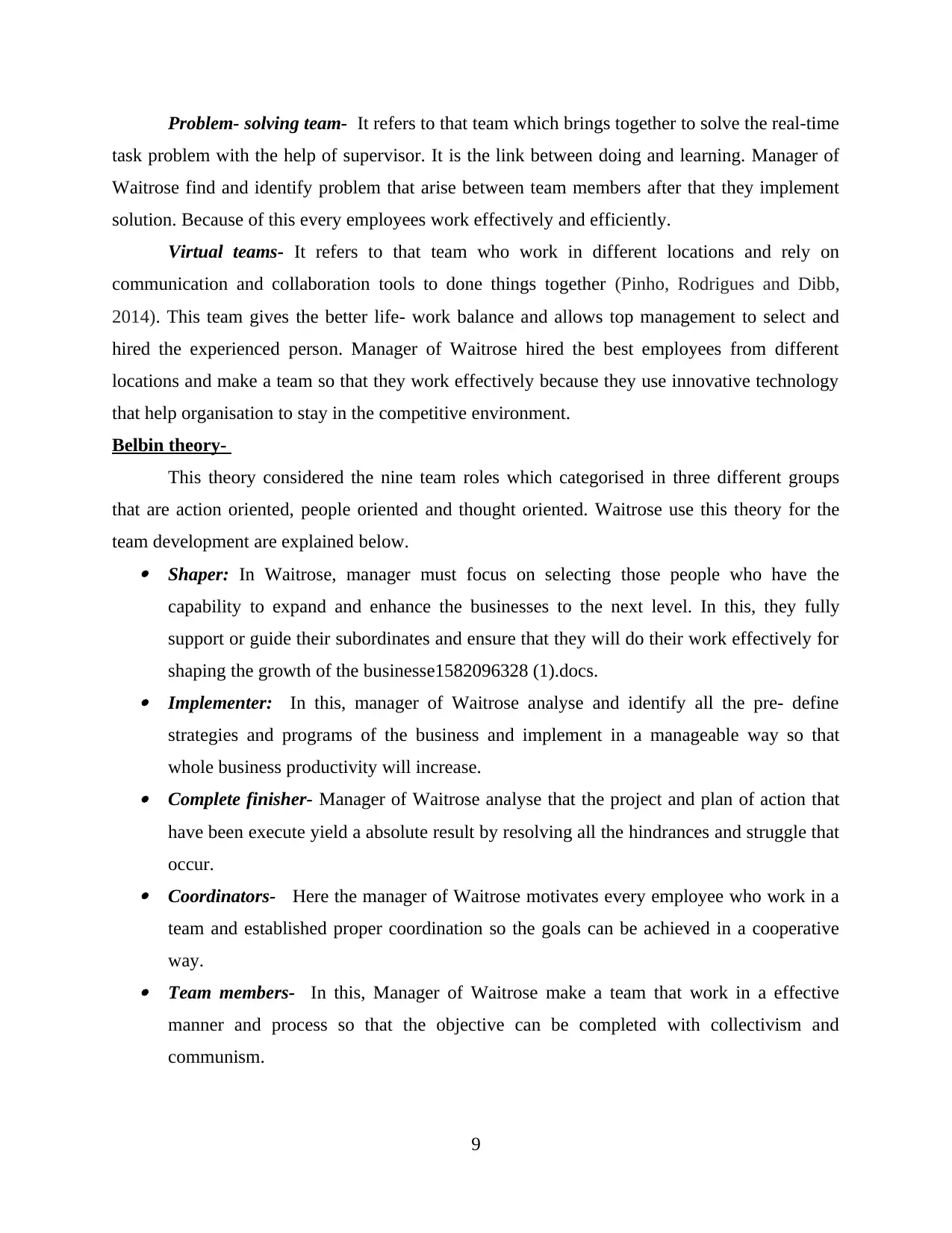
Problem- solving team- It refers to that team which brings together to solve the real-time
task problem with the help of supervisor. It is the link between doing and learning. Manager of
Waitrose find and identify problem that arise between team members after that they implement
solution. Because of this every employees work effectively and efficiently.
Virtual teams- It refers to that team who work in different locations and rely on
communication and collaboration tools to done things together (Pinho, Rodrigues and Dibb,
2014). This team gives the better life- work balance and allows top management to select and
hired the experienced person. Manager of Waitrose hired the best employees from different
locations and make a team so that they work effectively because they use innovative technology
that help organisation to stay in the competitive environment.
Belbin theory-
This theory considered the nine team roles which categorised in three different groups
that are action oriented, people oriented and thought oriented. Waitrose use this theory for the
team development are explained below. Shaper: In Waitrose, manager must focus on selecting those people who have the
capability to expand and enhance the businesses to the next level. In this, they fully
support or guide their subordinates and ensure that they will do their work effectively for
shaping the growth of the businesse1582096328 (1).docs. Implementer: In this, manager of Waitrose analyse and identify all the pre- define
strategies and programs of the business and implement in a manageable way so that
whole business productivity will increase. Complete finisher- Manager of Waitrose analyse that the project and plan of action that
have been execute yield a absolute result by resolving all the hindrances and struggle that
occur. Coordinators- Here the manager of Waitrose motivates every employee who work in a
team and established proper coordination so the goals can be achieved in a cooperative
way. Team members- In this, Manager of Waitrose make a team that work in a effective
manner and process so that the objective can be completed with collectivism and
communism.
9
task problem with the help of supervisor. It is the link between doing and learning. Manager of
Waitrose find and identify problem that arise between team members after that they implement
solution. Because of this every employees work effectively and efficiently.
Virtual teams- It refers to that team who work in different locations and rely on
communication and collaboration tools to done things together (Pinho, Rodrigues and Dibb,
2014). This team gives the better life- work balance and allows top management to select and
hired the experienced person. Manager of Waitrose hired the best employees from different
locations and make a team so that they work effectively because they use innovative technology
that help organisation to stay in the competitive environment.
Belbin theory-
This theory considered the nine team roles which categorised in three different groups
that are action oriented, people oriented and thought oriented. Waitrose use this theory for the
team development are explained below. Shaper: In Waitrose, manager must focus on selecting those people who have the
capability to expand and enhance the businesses to the next level. In this, they fully
support or guide their subordinates and ensure that they will do their work effectively for
shaping the growth of the businesse1582096328 (1).docs. Implementer: In this, manager of Waitrose analyse and identify all the pre- define
strategies and programs of the business and implement in a manageable way so that
whole business productivity will increase. Complete finisher- Manager of Waitrose analyse that the project and plan of action that
have been execute yield a absolute result by resolving all the hindrances and struggle that
occur. Coordinators- Here the manager of Waitrose motivates every employee who work in a
team and established proper coordination so the goals can be achieved in a cooperative
way. Team members- In this, Manager of Waitrose make a team that work in a effective
manner and process so that the objective can be completed with collectivism and
communism.
9
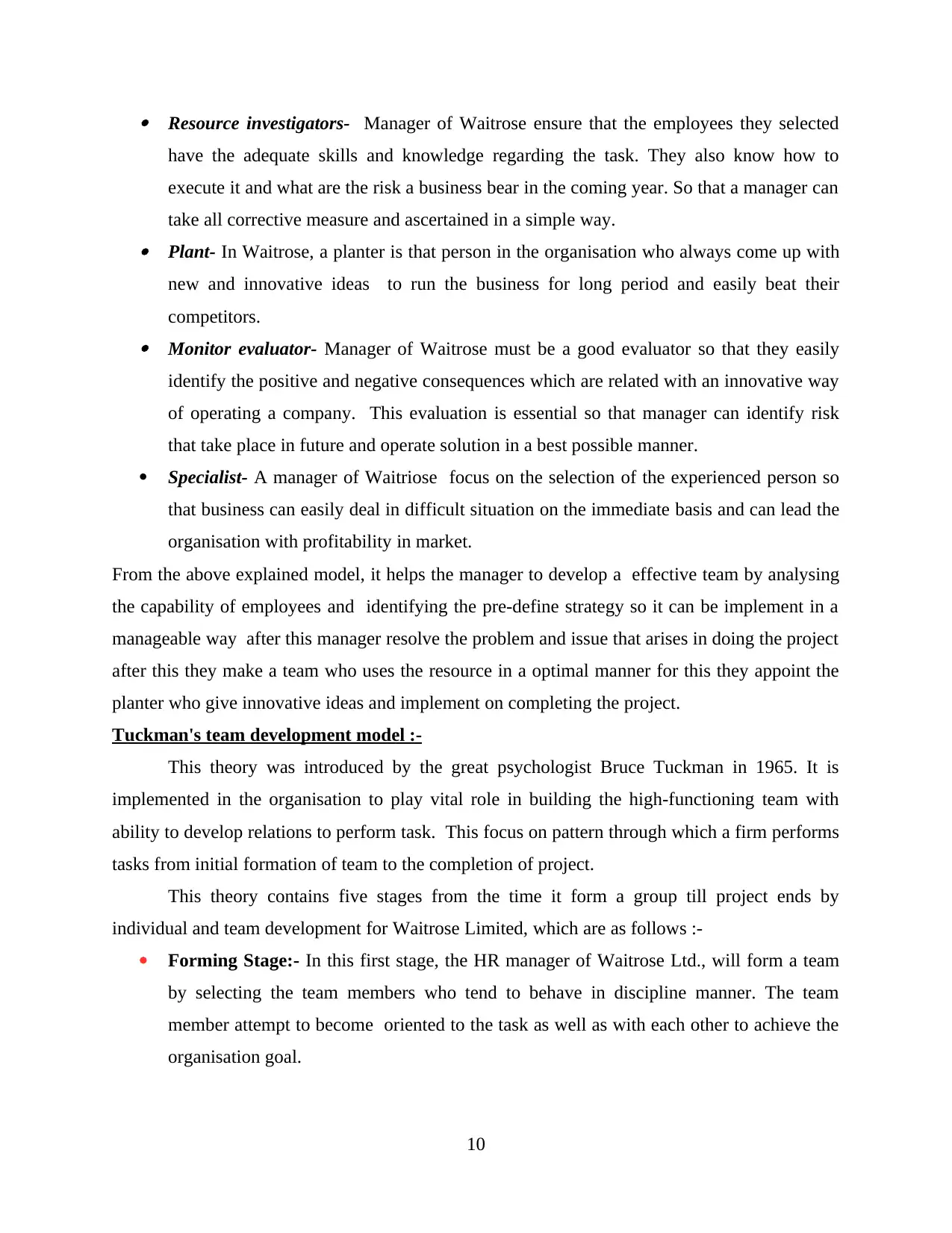
Resource investigators- Manager of Waitrose ensure that the employees they selected
have the adequate skills and knowledge regarding the task. They also know how to
execute it and what are the risk a business bear in the coming year. So that a manager can
take all corrective measure and ascertained in a simple way. Plant- In Waitrose, a planter is that person in the organisation who always come up with
new and innovative ideas to run the business for long period and easily beat their
competitors. Monitor evaluator- Manager of Waitrose must be a good evaluator so that they easily
identify the positive and negative consequences which are related with an innovative way
of operating a company. This evaluation is essential so that manager can identify risk
that take place in future and operate solution in a best possible manner.
Specialist- A manager of Waitriose focus on the selection of the experienced person so
that business can easily deal in difficult situation on the immediate basis and can lead the
organisation with profitability in market.
From the above explained model, it helps the manager to develop a effective team by analysing
the capability of employees and identifying the pre-define strategy so it can be implement in a
manageable way after this manager resolve the problem and issue that arises in doing the project
after this they make a team who uses the resource in a optimal manner for this they appoint the
planter who give innovative ideas and implement on completing the project.
Tuckman's team development model :-
This theory was introduced by the great psychologist Bruce Tuckman in 1965. It is
implemented in the organisation to play vital role in building the high-functioning team with
ability to develop relations to perform task. This focus on pattern through which a firm performs
tasks from initial formation of team to the completion of project.
This theory contains five stages from the time it form a group till project ends by
individual and team development for Waitrose Limited, which are as follows :-
Forming Stage:- In this first stage, the HR manager of Waitrose Ltd., will form a team
by selecting the team members who tend to behave in discipline manner. The team
member attempt to become oriented to the task as well as with each other to achieve the
organisation goal.
10
have the adequate skills and knowledge regarding the task. They also know how to
execute it and what are the risk a business bear in the coming year. So that a manager can
take all corrective measure and ascertained in a simple way. Plant- In Waitrose, a planter is that person in the organisation who always come up with
new and innovative ideas to run the business for long period and easily beat their
competitors. Monitor evaluator- Manager of Waitrose must be a good evaluator so that they easily
identify the positive and negative consequences which are related with an innovative way
of operating a company. This evaluation is essential so that manager can identify risk
that take place in future and operate solution in a best possible manner.
Specialist- A manager of Waitriose focus on the selection of the experienced person so
that business can easily deal in difficult situation on the immediate basis and can lead the
organisation with profitability in market.
From the above explained model, it helps the manager to develop a effective team by analysing
the capability of employees and identifying the pre-define strategy so it can be implement in a
manageable way after this manager resolve the problem and issue that arises in doing the project
after this they make a team who uses the resource in a optimal manner for this they appoint the
planter who give innovative ideas and implement on completing the project.
Tuckman's team development model :-
This theory was introduced by the great psychologist Bruce Tuckman in 1965. It is
implemented in the organisation to play vital role in building the high-functioning team with
ability to develop relations to perform task. This focus on pattern through which a firm performs
tasks from initial formation of team to the completion of project.
This theory contains five stages from the time it form a group till project ends by
individual and team development for Waitrose Limited, which are as follows :-
Forming Stage:- In this first stage, the HR manager of Waitrose Ltd., will form a team
by selecting the team members who tend to behave in discipline manner. The team
member attempt to become oriented to the task as well as with each other to achieve the
organisation goal.
10
⊘ This is a preview!⊘
Do you want full access?
Subscribe today to unlock all pages.

Trusted by 1+ million students worldwide
1 out of 16
Related Documents
Your All-in-One AI-Powered Toolkit for Academic Success.
+13062052269
info@desklib.com
Available 24*7 on WhatsApp / Email
![[object Object]](/_next/static/media/star-bottom.7253800d.svg)
Unlock your academic potential
Copyright © 2020–2026 A2Z Services. All Rights Reserved. Developed and managed by ZUCOL.




